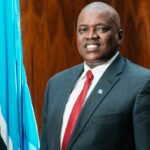Botswana’s newly elected President, Duma Boko, has articulated a vision to address the status of undocumented Zimbabweans in the country by providing temporary work and residence permits. In a recent BBC Africa Daily podcast, Boko emphasised the value of Zimbabwean workers, remarking that they often perform jobs that would otherwise remain unfilled.
Botswana is home to the second-largest community of Zimbabweans outside their homeland, many of whom have fled economic hardships. This influx has led to tensions and frequent deportations, as undocumented Zimbabweans face limited access to basic services and a higher likelihood of being marginalised. Despite potential public resistance to his proposal, particularly in a nation rich in diamond resources, Boko, 54, remains committed to his plans, which form a key part of his broader economic revitalisation strategy.
Discussing the porous border between Botswana and Zimbabwe, Boko described the challenges of managing large numbers of undocumented migrants. “They come in without documentation, limiting their access to services, and as a result, they often live outside the law, which can lead to crime and resentment,” he explained. His approach, therefore, involves a structured framework that acknowledges the Zimbabweans already living in Botswana.
While the exact number of Zimbabweans in Botswana is unclear, thousands have migrated since Zimbabwe’s economic collapse two decades ago. Available data indicates that Zimbabweans account for 98% of “irregular migrants” in the country. From 2021 to 2023, 13,189 of the 13,489 irregular migrants recorded were Zimbabwean. Daily deportations continue as many are arrested for lacking documentation or involvement in petty crime.
Most Zimbabweans work in labour-intensive roles, including domestic and farm work, jobs that many Batswana are reluctant to take on. “These workers take on roles that would otherwise remain vacant, so there’s no inherent conflict,” Boko noted.
However, the government faced public backlash recently over a proposal to allow identity cards instead of passports for travel between the two nations, with critics fearing an increased influx of Zimbabweans. Boko remains undeterred, advocating instead for skill-sharing opportunities that benefit both communities. “On construction sites across Botswana, Zimbabweans hold the majority of skilled roles in trades like welding and plumbing. We need a dual programme that allows them to work legally while fostering skills transfer to our citizens,” he said.
Boko, who founded the Umbrella for Democratic Change (UDC) in 2012 and has a background in human rights law, is known for his approachable style, often engaging with colleagues and citizens directly. His goal, he says, is to break down barriers and create an inclusive environment that welcomes ideas and suggestions from all.
A significant driver of his victory was his commitment to economic improvement. Among his initial priorities, Boko plans to renegotiate Botswana’s diamond agreement with global giant De Beers. He believes previous negotiations were poorly handled, jeopardising potential revenues and investor confidence. By securing diamond revenue, Boko aims to bolster the economy and meet his target of creating 100,000 jobs annually over the next five years.
In addition to his immigration policy, Boko envisions fostering entrepreneurship among Botswana’s youth. “They need government support to access affordable financing and markets,” he stated, aiming to cultivate a new generation of self-sufficient entrepreneurs.
Boko’s inauguration is set for Friday at Gaborone’s national stadium, an event declared a public holiday, with international dignitaries expected to attend.










